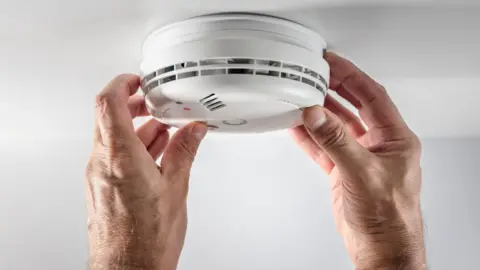New smoke alarm laws for all rental properties
 Getty Images
Getty ImagesAll private rental properties in Northern Ireland must now comply with new smoke alarm laws.
Smoke alarms must be installed in the room which is most frequently used for "general daytime living purposes" alongside every circulation space on each storey.
From Sunday, all existing and new tenancies must meet these requirements with the law, including new requirements for smoke, heat, and carbon monoxide alarms.
It first came into place on 1 September for new tenancies but now applies to all existing contracts.
A heat alarm must also be installed in every kitchen and a carbon monoxide alarm in any room or circulation space which contains a fixed combustion appliance or a flue.
In addition to this, the new laws will require smoke and heat alarms to be linked.
This law will only apply to private sector properties and not Northern Ireland Housing Executive (NIHE) properties.
A spokesperson for the NIHE said: "We have had heat and smoke detectors installed in our properties for many years."
'Amazed it has taken this long'
Aaron McKinney from AMPM NI estate agents told BBC News NI the new law is a positive change for the rental property market.
"Anything that protects life must be seen as a benefit; this will give tenants increased security that they and their family are protected," he said.
"It is not that landlords would intentionally put their tenant’s lives at risk, but to date, the presence of smoke alarms was only a vague recommendation."
Mr McKinney added that he is surprised it has taken this long for this to come into place.
"The risk will increase for agents and the amount of work they have to do when looking after a property, so I can see the fees agents charge increasing accordingly.
"It has taken a lot of hours to ensure we have protected - all our landlords, our electricians have never been so busy."

What is a heat alarm?
Heat alarms work differently to smoke alarms.
While a smoke alarm is designed to detect smoke, a heat alarm detects when there is a significant increase in temperature, and may help to indicate that a fire is starting, or is about to start.
Heat detectors are sometimes used in rooms where highly flammable substances or chemicals are stored.
They can also be useful in areas where there may be high levels of smoke and dust.
What will happen if landlords don't comply?
Communities Minister Gordon Lyons said the new regulations were designed to keep people safe.
If a landlord fails to comply with the new law, the council may instigate legal proceedings, according to the Department for Communities.
If convicted, landlords could face a fine of up to £2,500.
Landlords may also have an option to pay a fixed penalty fine of up to £500.
